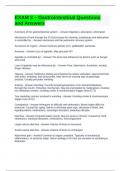EXAM 3 – Gastrointestinal Questions
and Answers
Functions of the gastrointestinal system: - Answer-Digestion, absorption, elimination
Movement of food through the GI tract (except for chewing, swallowing, and defecation)
is controlled by: - Answer-Hormones and the autonomic nervous system
Accessory GI organs - Answer-Salivary glands, liver, gallbladder, pancreas
Anorexia - Answer-Loss of appetite. May precede N/V
Appetite is controlled by: - Answer-The brain and influences by factors such as hunger
and smell
Loss of appetite may be influences by: - Answer-Fear, depression, frustration, anxiety,
drugs, disease
Nausea - Answer-Subjective finding accompanied by watery salivation, vasoconstriction
with pallor, sweating, and tachycardia. May serve as warning sign of pathologic
process. Usually precedes vomiting.
Emesis - Answer-Vomiting. Forceful emptying/expulsion of GI stomach/intestines
through the mouth. Protective mechanism. May be precipitated by medications. Involves
two medullary centers: vomiting center & chemoreceptor trigger zone (CTZ)
Two medullary centers involved in vomiting - Answer-Vomiting center & chemoreceptor
trigger zone (CTZ)
Constipation - Answer-Infrequent or difficulty with defecation. Bowel habits differ for
everyone. Caused by: aging, failure to eliminate upon urge, decrease in fluids, diet,
hypothyroidism, medications, neurologic disorders, sedentary lifestyle.
Diarrhea - Answer-Frequent watery stools. May be acute or chronic. Caused by: food
intolerance, intestinal disorders, medications, microorganisms
Large volume diarrhea - Answer-Volume of feces is increased
Small volume diarrhea - Answer-Volume of feces is unchanged
Abdominal pain - Answer-Common & vague complaint. Typically of mechanical,
inflammatory, or ischemic origin. Nerve endings in GI tract are sensitive to stretching &
distention.
, Peritonitis - Answer-Inflammation of the peritoneal cavity due to perforation. VERY
SERIOUS CONDITION.
Gastrointestinal bleeding - Answer-May be venous or arterial. Can have significant
blood loss. High risk of hypovolemic shock. Life threatening.
Upper GI bleed - Answer-Most common. Located in duodenum & UP (esophagus,
stomach, duodenum). Increased mortality in people with chronic diseases
Manifestations of UPPER GI BLEED - Answer-VOMITING. Decreased H&H,
hypotension/FVD, hematemesis (BRIGHT RED BLOOD=ESOPHAGUS) (COFFEE
GROUND EMESIS=STOMACH). Could cause blood in stool.
Hematemesis - Answer-Blood in vomit
Lower GI bleed - Answer-Jejunum & DOWN (Intestines, jejunum)
Manifestations of LOWER GI BLEED - Answer-Decreased H&H, hypotension/FVD,
RECTAL BLEEDING. Hematochezia (bright red bloody stools), Maroon stools, melena
(black tarry stool).
Hematochezia - Answer-Bright red bloody stools
Melena - Answer-Black tarry stools; has distinct odor
Peristalsis - Answer-Advancement of food through the GI tract by waves of smooth
muscles
Dysphagia - Answer-Difficulty swallowing
Upper esophageal sphincter - Answer-Keeps air from entering the esophagus during
respiration
Lower esophageal sphincter (LES) - Answer-Prevents gastric content from entering
(regurgitating) the esophagus
Causes of dysphagia - Answer-Altered cranial nerve function (V, IX, X, XII), other
neurologic impairment, narrowing/strictures of esophagus, tumors, cancer, scleroderma
Scleroderma - Answer-Autoimmune disorder characterized with overgrowth of collagen;
body becomes stiff
Odynophagia - Answer-Painful swallowing
Acalasia - Answer-Failure of the lower esophageal sphincter to relax, resulting in food
sitting in the esophagus. Caused by life stress/psychological problems.




